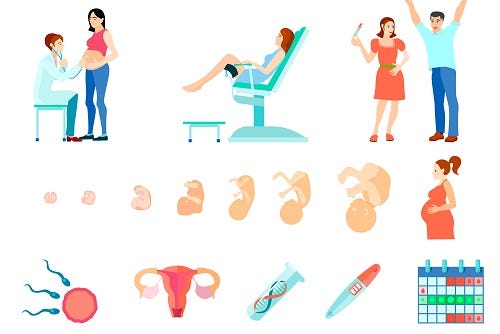ON PATIENT’S AUTONOMY AND ETHICS
Should medical students have rights to patient's bodies? Does going to the teaching hospital means you're an automatic specimen for medical students? What does the Hippocratic Oath say about autonomy.
Recently on Twitter, a medical student complained about how 4 out of 10 female patients in Obstetrics & Gynaecology (O&G) department of his teaching hospital are not comfortable with him being around during their medical consultation. What this means in simple words is that for every 10 women who came to the teaching hospital where he is training to become a doctor, 4 of these women don’t want him seeing their private parts. He complained about how this means he is not getting full training, and how would he compete globally if at home the training he received was average.
This brings me to some of the basic things I learnt during the first three months of second year in med school in Community Health class. The damn Hippocratic oath.
The Hippocratic Oath encompasses a set of ethical principles and guidelines for physicians, emphasizing their moral obligations to their patients and the profession. While variations exist, the classical version of the oath consists of several key tenets:
1. Beneficence: Physicians pledge to use their medical knowledge and skills to benefit patients, preserving their health and well-being to the best of their abilities.
2. Non-Maleficence: A commitment to "do no harm" is a central element of the oath. Physicians vow to avoid intentional harm and to act in their patients' best interests.
3. Confidentiality: Patient confidentiality is a paramount concern. Physicians pledge to keep all patient information confidential, ensuring privacy and trust.
4. Autonomy: Respecting patient autonomy is vital. Physicians vow to empower patients to make informed decisions about their medical care.
5. Justice: Physicians pledge to treat patients fairly and without discrimination, regardless of their background, status, or circumstances.
6. Teaching and Mentorship: The oath emphasizes the duty to educate the next generation of physicians, ensuring the continuity of ethical medical practice.
7. Respect for Colleagues: Physicians pledge to work collaboratively with their colleagues, showing respect and professionalism in all interactions.
The damn OATH already gives patients autonomy. That is, it clearly states that patients are the ones calling the shots as regards their own health, as long as they make this decision informed and of sound mind. Medical practitioners CANNOT and SHOULD NEVER force themselves to be in a patient’s treatment plan or room, especially when the patient has clearly indicated that they do not want them.
I know what you’re thinking and it is: but this is a teaching hospital and what if all patients decides that they don’t want to be used as a training specimen. Well, those are valid questions and here are the answers.
First, a teaching hospital doesn’t mean all the patients are automatically a teaching subject. Rather, what it means is that all patients are potential subjects. The key word is potential. All patients in a teaching hospital are potentially a subject, but that doesn’t mean you have automatic access to their bodies. It is why medical students must take permission and get informed consent before doing anything on a patient. Also, the teaching aspect is mostly observing and shadowing, so it’s the consultants and the registrars that are really calling the shots. In fact, a medical student rarely get to do things like operate, prescribe, palpate, and auscultate without supervision and the essence of the supervision is to catch any lapses and ensure no irreversible damage is done by the medical students.
Secondly, there is no universe where, hypothetically, all the patients in a teaching hospital would outright and adamantly refuse to let medical students be part of their management team. In fact, some patients/their relatives help medical students out when they have minor lapses like incomplete clerking by assuming faults. In addition, there is nothing bad with letting patients see reasons as to why medical students actually have to be involved; today’s medical student is tomorrow’s doctor. The consultant/senior members of the management team can always advocate for the students but it CAN’T be forced. You can’t as a consultant, threaten to discontinue a patient treatment if they don’t let your students see their vagina and examine their breasts. That’s just crazy abuse of power.
Medical students must be grateful for every time they get to learn with a living being. You did not create them; you are not their god; you do not own their body; and they are not your automatic lab rats for learning. Medical ethics exists for a reason. As much as we train to be globally competent, we must incorporate other practices from foreign countries that makes their healthcare more advanced.
I can’t imagine working in a world-class hospital like John Hopkins and stubbornly refusing to give a patient privacy when they’ve clearly asked for it. If we want our hospitals to compete globally, we must be ready to advance globally and meet up with world-standard practices.








This is super insightful. Learnt a bunch and I can relate as well, 'cos OnG is my current rotation in school.